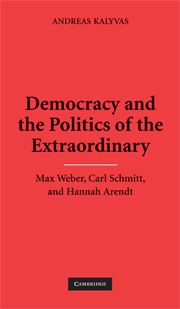Book contents
- Frontmatter
- Contents
- Acknowledgments
- List of Abbreviations
- Introduction: The Extraordinary and Political Theory
- I CHARISMATIC POLITICS AND THE SYMBOLIC FOUNDATIONS OF POWER
- II THE EXCEPTION AND CONSTITUTIONAL POLITICS
- III TAMING THE EXTRAORDINARY
- Conclusion: A Democratic Theory of the Extraordinary
- Bibliography
- Index
- References
Conclusion: A Democratic Theory of the Extraordinary
Published online by Cambridge University Press: 04 August 2010
- Frontmatter
- Contents
- Acknowledgments
- List of Abbreviations
- Introduction: The Extraordinary and Political Theory
- I CHARISMATIC POLITICS AND THE SYMBOLIC FOUNDATIONS OF POWER
- II THE EXCEPTION AND CONSTITUTIONAL POLITICS
- III TAMING THE EXTRAORDINARY
- Conclusion: A Democratic Theory of the Extraordinary
- Bibliography
- Index
- References
Summary
The writings of Max Weber, Carl Schmitt, and Hannah Arendt consist of unique and powerful insights on the extraordinary and the politics of foundings. Their respective notions of charisma, constituent power, and new beginnings were deployed to describe political origins and account for originary and transgressive moments of symbolic and legal innovation and for constitutional creation. These three concepts clearly distinguish their authors' approaches from the conventional concerns of modern political theory, setting them apart from its prevalent orientations and interests. The atypical qualities of Weber, Schmitt, and Arendt not only continue to enrich our political vocabulary with new concepts and arguments but also open up imaginative ways to think about the significance of unpredictable and discontinuous deeds that defy the established order, challenge the scope and content of institutionalized politics, and transgress the limits of the possible and the accepted. All three thinkers sought, despite the many differences that separate their works and their distinct perspectives, to elucidate those brief and rare events of political excess whereby a community redefines itself and radically transforms the form of its existence.
More importantly, however, their accounts of the extraordinary suggest elements of a new theory of democracy with a radical intent. Although these elements of the respective projects of Weber, Schmitt, and Arendt remained incomplete, even unclear, often misunderstood, and thus overlooked or marginalized by most scholarly commentaries, they do gesture toward an original, compelling understanding of radical democratic politics.
- Type
- Chapter
- Information
- Democracy and the Politics of the ExtraordinaryMax Weber, Carl Schmitt, and Hannah Arendt, pp. 292 - 300Publisher: Cambridge University PressPrint publication year: 2008

